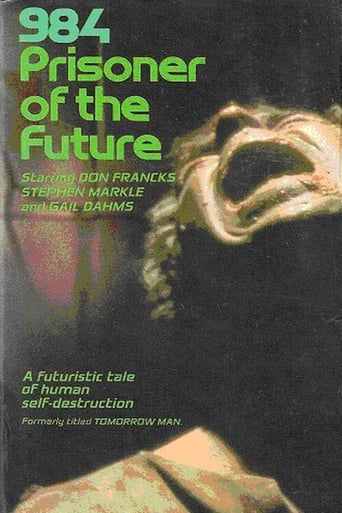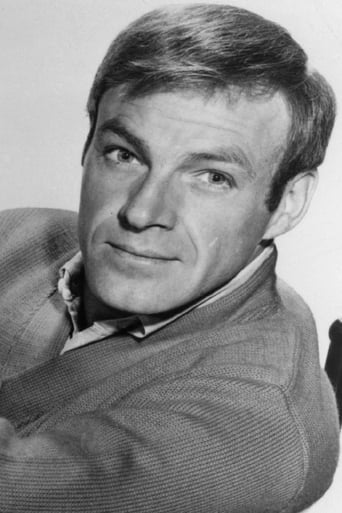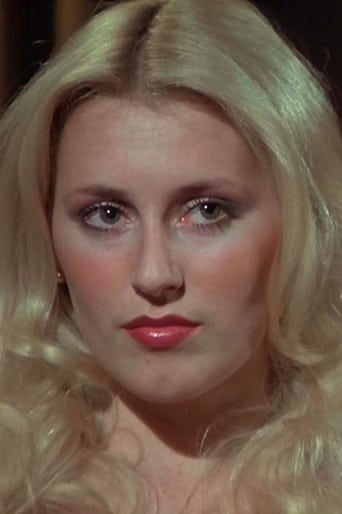984: Prisoner of the Future (1982)
A corporate executive is taken prisoner by an underground organization known as The Movement, and is turned over to a ruthless interrogator.
Watch Trailer
Cast
Reviews
I like the storyline of this show,it attract me so much
Lack of good storyline.
While it doesn't offer any answers, it both thrills and makes you think.
An old-fashioned movie made with new-fashioned finesse.
984: PRISONER OF THE FUTURE was the pilot for a Canadian television that never went to series but was instead released as a TV movie in 1982. Having watched it twice now, I can understand why it was never picked up but I also want to be clear that I respect what they were trying to do. Buried somewhere in the poor direction, poor editing, and poor script is a story with the potential to have made for an interesting show. With a budget and proper filmmakers behind the scenes, this could have been a cool dystopian science fiction drama. Instead it's a bit of a mess with the occasional flicker of interesting material. It drops you right in the middle of the story from the very beginning. When we first meet our protagonist Tom Weston (Stephen Markle), he's locked in a nondescript prison cell. He's been assigned a prisoner number (984, obviously) and his only socialization from comes prisoner #30 in the cell next door. It's obviously sometime in the future because the guards are some sort of robot on wheels with glowing red laser eyes (also, it's stated plainly in the title) but otherwise there's little to see because the entire film looks as if it was shot in an abandoned warehouse. There's nothing but brick walls and concrete floors, and I'm pretty sure the prisoner intake flashback scene was shot on the loading dock. I found myself distracted by this obvious fact but, to be fair, I'd have been willing to forgive the low budget location restrictions if the movie had been executed better.Weston is some sort of political prisoner, I think. The events leading to his incarceration are revealed in flashbacks over the course of the movie and exposition comes from Weston's interactions with the giddily psychotic warden (Don Francks). Here lies my biggest problem with PRISONER OF THE FUTURE; thanks to the poor editing, direction, and script (and the less than stellar audio transfer on my DVD copy), I was left completely baffled at the constant nonsensical backstory information. I believe he's a political prisoner who has been imprisoned for crimes committed against something called the Movement. I thought the Movement was a resistance faction but apparently they might actually be the ones in charge. The warden seems determined to squeeze a confession from Weston but Weston holds strong that he has no idea what's going on. He seems 100% convinced that he's been wrongly accused but the warden hits him with evidence that Weston's friends and associates (and mistress?) were all co-conspirators. But then I got the impression from some of the flashback sequences that Weston was actually in trouble for refusing to commit atrocities in the name of the Movement. So was he imprisoned because he refused to play ball with the baddies? At this point, I'm still unclear. Director Tibor Takács and screenwriters Peter Chapman and Stephen Zoller seem to have forgotten that, for the audience to care about our hero, we really should know and understand what he's going through. Since I have no concept of where he stands in all this, I have a hard time sympathizing. Is he a criminal? Or a victim?PRISONER OF THE FUTURE is a pretty rough watch but I'll give it credit for trying. Unlike a lot of the Z-grade movies I've made myself suffer, at least Takács and cinematographer Alar Kivilo try to get creative in how they shot it. Rarely is the camera locked down while we're forced to watch the same static frame while characters rattle off dialogue. The camera does its part in trying to tell the story and for that it gets some respect. PRISONER OF THE FUTURE may be a lame TV movie but it's giving it an effort. Sadly the cinematography is one of the few positive notes I've got on the movie. But not the only one. I still love the robot guards and my interest piqued whenever they were on screen. There was an especially cool bit in the finale where they're pursuing Weston and flailing at him with karate-chopping action figure skills. The whole use of torture and brainwashing to break the prisoners was pretty cool (we see the effects of it on prisoner #1170, who goes from smarmy businessman to sniveling wimp over the course of his stay) and we get an interesting reveal at the end about Weston's imprisonment that I would've like to delve into further. I'm guessing that would've been the ongoing thread if this ever went on to become a full-fledged series. Really, that's the most frustrating part of this movie. It doesn't get truly interesting until the very last few minutes but by then it's too late and the credits are rolling. I can't really imagine where 984: PRISONER OF THE FUTURE could've gone with a full series run and I'm left to wonder if it was doomed from the start, but using this confusing mess of a movie pilot probably wasn't starting them off on the right foot anyway.
An executive is taken as a political prisoner and detained in a detention centre. He, along with others, is accused of being a conspirator who wishes to topple the new dictatorial communist-like government who have taken control. From here he is tortured in an attempt to make him confess to his involvement.984: Prisoner of the Future is an unnecessarily confusing film. Its story is really fairly straightforward but it's told in a way that results in more questions than answers. In quite a few other films this would be a pretty good thing but this one doesn't have the overall pay-off to really justify this approach. In fairness to it, this story-telling method was very probably a result of this being the pilot for a TV series. They obviously wanted to whet the audience's appetite with several unresolved plot threads that would get them excited enough to generated enough interest in a series. Unfortunately for the film-makers no series came of this, so this is all we have and this explains the vague nature of it. It's very possible they quickly put together the ending too, so that this pilot could go out as a standalone feature film. Whatever the case, the result is a pretty unsatisfying film. The low production values don't really help – the low budget would have been less of a problem in a TV series to be fair – but mainly it's the fact that the overall story seems to have little point that sinks this one.
Successful executive Tom Weston (Stephen Markle) is taken to a high security detention centre, accused of being in cahoots with a group of rich businessmen dedicated to toppling current ruling regime The Movement, whose leader Dr. Fontaine (Andrew Foot) seeks to punish the rich and powerful for past indiscretions and recondition them for life in his 'new world'. Weston continually denies his involvement, even after undergoing torture, but although the warden (Don Francks) secretly believes that his prisoner is innocent, he has his own reason for continuing with his sadistic game.Directed by Tibor Takacs, the man who gave us entertaining 80s popcorn horrors The Gate (1987) and I, Madman (1989), this dystopian made-for-TV sci-fi has a cool central idea that might have been extremely effective as a half hour episode of a Twilight Zone-style series, but doesn't work as well stretched out over 76 minutes. Alternating between flashbacks and confrontations between prisoner and warden, the story becomes frustratingly repetitive, and the final revelation—which proves to be such a shock for Weston—is far too easy to guess for anyone paying the slightest bit of attention.4 out of 10, rounded up to 5 for the hilarious roller-skating robot guards.
I had never heard of this obscure title until picking it up at a run-down video rental store, but I'm glad that I didn't pass up this rare opportunity. Other than the laughably bad effects (particularly the "enforcer robots"), this film has quite a lot of entertainment value, and tells a gripping (albeit incredibly confusing) story of one man's descent into madness in a post-apocalyptic future. For the incredibly limited budget it looks to have had as a TV movie, the film is definitely effective beyond its presupposed boundaries.Stephen Markle plays Tom Weston, an affluent businessman/politician (it is never really clear), content with the current government and his way of life. When "The Movement" (a quasi-fascistic socialist political organization that promises a future of peace) arises behind media mogul Dr. Fontayne, Weston is approached by his representatives, whom he refuses to cooperate with. Upon their rise to power, he soon finds himself thrown into a brutal futuristic prison along with several associates, where he is constantly interrogated by a sadistic warden (Don Francks) that does everything imaginable to psychologically torture him into admitting to crimes he is innocent of. The warden is terrifyingly persistent Weston is tortured day in, day out for over ten years, with no human contact, until he finally can no longer distinguish between reality and fantasy. Over the years, Weston is tantalized by the sounds of chirping birds and children playing just outside his prison cell, which he hears through a small window high up the cement wall. The only thing that keeps him going is this and the thought of rejoining his wife on the outside world.Much of the film is revealed through flashbacks during interrogation sequences we see how Weston was implicated in a plot to overthrow "The New Order" by force due to his association with Michael Roland (David Clement), his friend and politician. It is never made clear whether or not Weston is guilty, forcing the audience to come to their own conclusions. Are we to believe that he is innocent? How do we know that his flashbacks are not simply hallucinations brought forth through suggestion? This could either be the result of inferior film-making, or an intentional construct to force the viewer to experience the same confusion that Weston experiences. I would like to think it's the latter.Spoiler ahead: Throughout the film there are cryptic implications that the great "New World" outside the prison walls may not be everything the warden has made it out to be, and prison aides make unsettling comments about "the end." When prison guard Jeffries (Stan Wilson) enters Weston's cell, leaving the door open, he encourages him to escape, claiming that "it's over for all of us." Weston attempts to outrun the security drones and escape this futuristic labyrinth. Finding escape to be impossible, he returns to his cell, climbing up the wall in desperation to peer out the window to see only a barren desert, and a small speaker mounted on the outside wall, continually piping in the sounds of a once-thriving world.Apparently this was a pilot for a Canadian television series. It's not hard to see why it failed: the plot is simply too convoluted for all but the most die-hard science fiction fans, and it's dystopian vision too bleak for the audience to be left wanting more.Other than the aforementioned flaws, 984 (or The Tomorrow Man) is an entertaining film, and should be appreciated by fans of low budget science fiction, the post-apocalyptic, or those with a taste for unhappy endings.





